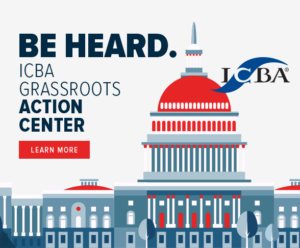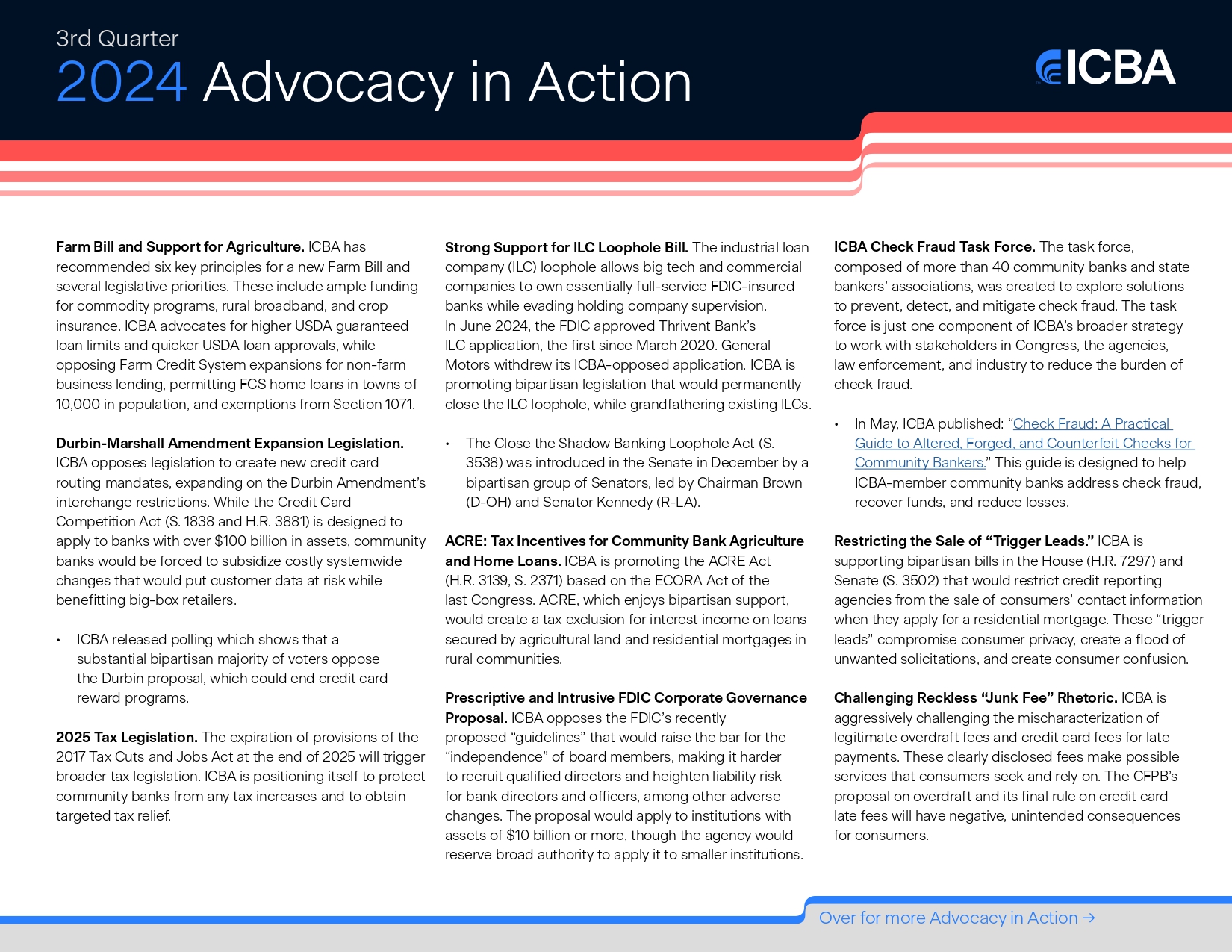Key Issues & Resources
Explore ICBA's advocacy for community banks on key issues like Farm Bill support, credit card routing mandates, tax legislation, and ILC loophole closure. Read about their stance on crypto regulation and more.
Links & Resources
Read ICBA's priority news here.

Media releases, images and more are available to share this message with your customers at the ICBA Plan Ahead page.
Office of the State Bank Commissioner
Federal Deposit Insurance Corporation (FDIC)
Federal Reserve Bank of Kansas City
Federal Financial Institutions Examination Council (FFIEC)
FHLBank Topeka
Independent Community Bankers of America(ICBA)
Office of the Comptroller of the Currency (OCC)
Securities and Exchange Commission (SEC)
Farm Bill and Support for Agriculture
ICBA has recommended six key principles for a new Farm Bill and several legislative priorities. These include ample funding for commodity programs, rural broadband, and crop insurance. ICBA advocates for higher USDA guaranteed loan limits and quicker USDA loan approvals, while opposing Farm Credit System expansions for non-farm business lending, permitting FCS home loans in towns of 10,000 in population, and exemptions from Section 1071.
Durbin-Marshall Amendment Expansion Legislation
ICBA opposes legislation to create new credit card routing mandates, expanding on the Durbin Amendment’s interchange restrictions. While the Credit Card Competition Act (S. 1838 and H.R. 3881) is designed to apply to banks with over $100 billion in assets, community banks would be forced to subsidize costly systemwide changes that would put customer data at risk while benefitting big-box retailers.
ICBA released polling which shows that a substantial bipartisan majority of voters oppose the Durbin proposal, which could end credit card reward programs.
2025 Tax Legislation
The expiration of provisions of the 2017 Tax Cuts and Jobs Act at the end of 2025 will trigger broader tax legislation. ICBA is positioning itself to protect community banks from any tax increases and to obtain targeted tax relief.
Strong Support for ILC Loophole Bill
The industrial loan company (ILC) loophole allows big tech and commercial companies to own essentially full-service FDIC-insured banks while evading holding company supervision. In June 2024, the FDIC approved Thrivent Bank’s ILC application, the first since March 2020. General Motors withdrew its ICBA-opposed application. ICBA is promoting bipartisan legislation that would permanently close the ILC loophole, while grandfathering existing ILCs.
The Close the Shadow Banking Loophole Act (S. 3538) was introduced in the Senate in December by a bipartisan group of Senators, led by Chairman Brown (D-OH) and Senator Kennedy (R-LA).
ACRE: Tax Incentives for Community Bank Agriculture and Home Loans
ICBA is promoting the ACRE Act (H.R. 3139, S. 2371) based on the ECORA Act of the last Congress. ACRE, which enjoys bipartisan support, would create a tax exclusion for interest income on loans secured by agricultural land and residential mortgages in rural communities.
Cannabis Banking
ICBA supports legislation that would create a safe harbor from federal sanctions for financial institutions that serve cannabis-related businesses in states where cannabis is legal.
The SAFE Banking Act has passed the US House of Representatives seven times in previous Congresses. In September, the Senate Banking Committee passed similar legislation, the SAFER Banking Act (S. 2860).
Crypto Assets, Decentralized Finance
ICBA has strong concerns about recent actions by FHFA, including a decision to allow Freddie Mac to engage in a pilot product to purchase certain single-family closed-end second mortgages. Further, FHFA’s recent recommendations for the reform and restructuring of the FHLB System would prevent or limit community bank access to advances and liquidity. ICBA is forming an FHLB Task Force to advocate against such changes.
Stablecoins, Decentralized Finance
Unregulated crypto assets, including stablecoins, as well as decentralized finance (DeFi), threaten to disintermediate community banks and heighten risks for the wider economy and must be appropriately regulated. ICBA strongly opposes efforts to grant nonbank stablecoin issuers access to the Federal Reserve master account and to license novel nonbank issuers not subject to the same regulation as community banks.
ICBA has convened a Digital Assets Subcommittee to examine and deliberate issues related to a proposed CBDC and digital assets.
ICBA continues to raise concerns and advocate for improvements to legislative proposals creating a regulatory framework for stablecoins, including the “Clarity for Payment Stablecoins Act” (H.R. 4766), which was marked up by the House Financial Services Committee in July 2023.
Central Bank Digital Currency
ICBA opposes a U.S. CBDC which would compete with community bank deposits needed to fund local lending and undermine consumer privacy, among others.
ICBA supports the CBDC Anti-Surveillance State Act (S. 3801, H.R. 5403), which would address many of ICBA’s concerns with the creation of a CBDC. H.R. 5403 passed the House in May.
EGRPRA Review
ICBA is calling on regulators to conduct a comprehensive regulatory review under the Economic Growth and Regulatory Paperwork Reduction Act, or EGRPRA, the 10-year review to identify outdated or otherwise unnecessary regulatory requirements. Regulators must take bold action to eliminate one-size-fits-all mandates that fail to consider the community banking business model.
ICBA Anti-Credit Union “Something’s Wrong” Campaign
Following a surge in credit union acquisitions of banks, ICBA launched its “Something’s Wrong” targeted digital ad campaign and website to highlight the harm done by the credit union industry’s aggressive and abusive exploitation of their tax exemption.
ICBA is requesting hearings on Navy Federal’s discriminatory mortgage lending practices revealed in an analysis by CNN.
Section 1033 Exemption
ICBA is seeking accommodations for community banks in the implementation of its Dodd-Frank Section 1033 rule. Specifically, ICBA is urging the CFPB to exempt community banks with less than $850 million in assets — “small businesses” as defined by the Small Business Administration — from a requirement to create and maintain a third-party developer interface.
In addition, ICBA is asking the CFPB to permit banks to charge third parties a reasonable fee for providing access to consumer information. Section 1033 requires financial institutions to make available to consumers and authorized third parties data relating to consumers’ transactions and accounts.




